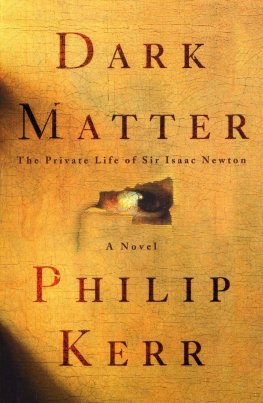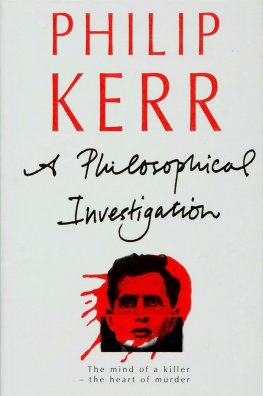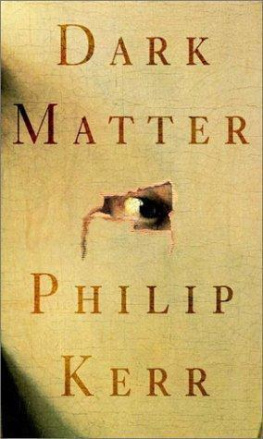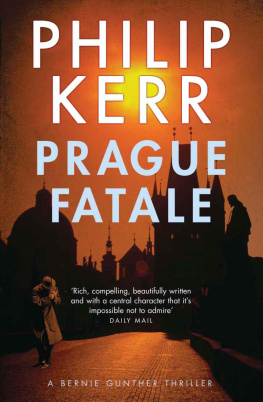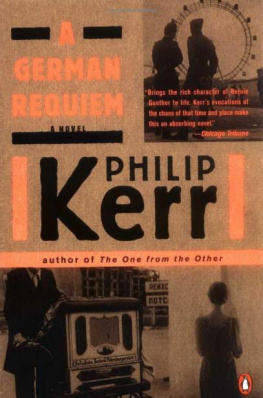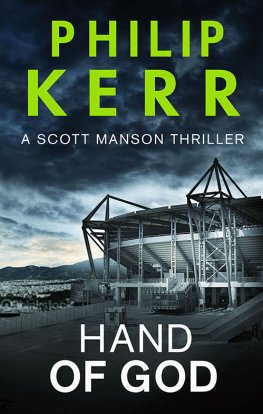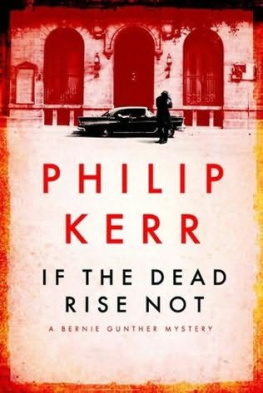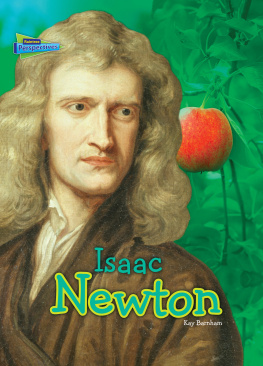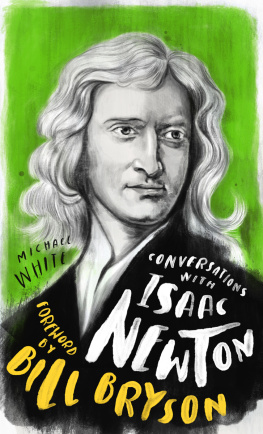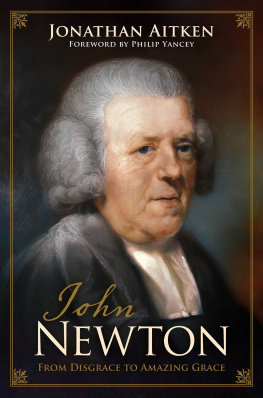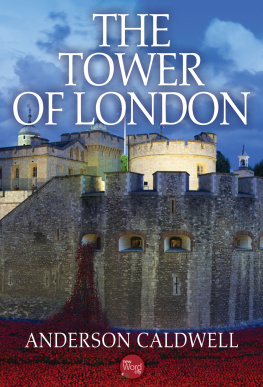Philip Kerr
Dark Matter: The Private Life of Sir Isaac Newton

a. Moat
b. Water Lane
c. Bloody Tower
d. Salt Tower
e. Broad Arrow Tower
f. Irish Mint
g. Brass Mount h. English Mint
i. Wardens House
j. Masters House
k. Brick Tower (home of the Master of Ordnance)
1. Chapel
m. White Tower
n. Tower Green
o. Beauchamp Tower
p. Bell Tower
q. Comptrollers House & Yard
r. Entrance to the Mint (and Newtons office)
s. By ward Tower
t. Middle Tower
u. Lions Tower
v. Tower Street to East London
ARISE, SHINE; FOR THY LIGHT IS COME, AND THE GLORY OF THE
LORD IS RISEN UPON THEE.
(ISAIAH 60:1)
I swore not to tell this story while Newton remained alive.
On the morning of the twenty-eighth of March 1727 Sir Isaac Newton having died some eight days previously I took a coach from my new lodgings in Maiden Lane, Covent Garden, with Doctor Samuel Clarke, who was Newtons friend and commentator, to the Abbey to see Newton lie in state like some fabulous Greek hero.
We found him in the Jerusalem Chamber, a great oak-paneled room with a large open fireplace that lies to the southwest of the Abbey, where there are some tapestries and stained glass ascribed to the period of Henry III, and marble busts of Henry IV and Henry V. It is said that Henry IV had a fit while praying one day in the Abbey and was carried into the Jerusalem Chamber where he died, thus fulfilling the prophecy that he would die in Jerusalem.
I cannot answer for whether the likeness of Henry was a good one, but Newtons embalmer had done his job well and not made the face up like a whore, which is a very common failing with these people. His flesh looked quite natural, being florid, soft and full, as if the man had been only sleeping. And since there was no perceptible smell, Newton having been dead for a week or more, which is a long time for a corpse to be out of the ground, I could readily attest to the efficiency of the embalmers hand at least, for although Spring was not quite arrived, it had been quite warm of late.
The man I saw, laid out in an open coffin upon a great long refectory table, wore a full-bottomed flaxen wig, a plain white linen stock, and a black three-piece suit. His face was lined, somewhat heavy about the jowls and, despite a keen, aquiline nose that had always put me in mind of the Roman, not unkind. I had thought I might have perceived in the air of his face some of the penetrating sagacity which had once distinguished his composures. Perhaps even some final wisdom. But in death Newton was a quite unremarkable-looking figure.
He was in great pain with the stone when he died, said I.
But still quite lucid, replied Doctor Clarke.
Aye. He was always that. Newton was the most lucid of souls. Newton looked upon all of creation as a riddle, with certain clues that were laid about this world by God. Or perhaps as a kind of cipher which, by great concentration of mind, he might translate. I think he believed that a man who might decipher an earthly code might similarly fathom the heavenly one. He believed nothing unless he could prove it as a theorem or draw it as a diagram.
Newton has given us the golden thread by which we may find our way through Gods labyrinth, said Doctor Clarke.
Yes, I said. Perhaps that is right.
After dinner I returned to my lodgings in Maiden Lane. I slept uneasily, alone with my still-smouldering remembrances of him. I could not say that I had known Newton well. I doubt there was any man or woman who could ever have claimed as much as that. For he was not just a rare bird but a shy one, too. And yet I can say that for a while, with the exception of Mrs. Conduitt, I knew him as well as anyone could have known him.
Until I met Newton I was like London before the Great Fire, and gave little thought to the poor repair of my intellectual buildings. But when I encountered his spark, and the strong wind of his mind fanned the flames in the narrow streets of my own poor brain which were quite filled with rubbish most of them, for I was young and foolish then the fire took hold so quickly that it raged quite unchecked.
Perhaps, if it had been just the fire ignited by his own acquaintance, something of the man I was might have been saved. But there was also the fire in my heart that was ignited by his niece, Mrs. Conduitt Miss Barton that was and, in a case such as this, with fires breaking out in several places at once, and at so great a distance from each other, then the whole conflagration seemed like the result of some great and malevolently supernatural design. For one all too brief and brilliant moment my sky was quite lit up, as if by fireworks. The next, I lay overwhelmed and everything was consumed. My church maimed irreparably; my soul boiled away to nothing; my heart burned to a cold black cinder. In short, my life reduced to ashes.
Of course, after the fire comes the rebuilding. Sir Christopher Wrens many great designs. St. Pauls. Yes, its true, I had my own projects. The fact that I am a retired colonel might leave one to suppose that something arose from the ashes of my former life. But the rebuilding was difficult. And not entirely successful. Indeed, I sometimes think it would have been better if, like King Priam slain by Neoptolemus in the burning ruins of Troy, I too had died after we parted.
Doctor Clarke did not have the patience to be told as much. Doubtless he was still inclined to believe Doctor Newton was someone who gave sight to the blind. But any soldier will tell you that sometimes you can see too much. Even the most courageous man can become quite untrussed at the sight of the enemy. Could King Lenidas with his one thousand Spartans have held the pass at Thermopylae for two whole days if his men had seen the whole host of the Persian army before them? No, there are occasions when it is better to be blind.
Clarke had said that Newton had given us the golden thread by which we may find our way through Gods labyrinth. Well, that is how I first perceived his work, myself. Only the creator of the labyrinth institutes it otherwise, there being no end to the labyrinth, for it is infinite, at which junction one lights upon the awful discovery that neither is there a creator. But I do not like a labyrinth so well as a chasm or an abyss into which Newton, by virtue of his system of the world and falling bodies and mathematics and chronology, lowers us upon a rope, which is a more precarious situation wherein gravity may do its invisible work.
Invisible work. Newton knew all about that. His theory of gravity, of course. His interest in alchemy, for example. And ciphers, too. When I told Doctor Clarke how Newton had believed that a man who might decipher an earthly code might similarly fathom the heavenly one, I could have told Clarke such a story of codes and ciphers and secrets as would have made his wig smoke. But no. Doctor Clarke would not have had the patience to hear such a story as mine, for it is a difficult tale and besides, I am a soldier, without much skill in talk. Moreover, I lack the practice in its recounting since it has not been told before this day. Newton himself swore me to secrecy about this dark matter, as he himself called it. Yet now that the great man is dead I can see no reason not to tell someone. But who? And how would I have begun? I fear I am too cool to have mastered the unaffected eloquence and noble, simple style of history that would hold anyones attention for very long. It is the Englishmans malady. We are too plain in our speaking to make a good tale in the telling. I must confess there is much about my own history that I have forgotten. It is difficult for me to remember all of this. More than thirty years have passed and there are many aspects to this story that seem to elude my grasp. But perhaps it is me who is lacking, for I do not find myself very interesting; and certainly not in comparison with Newton. How could I ever have thought to understand one such as he? I was not a man of letters. I could better describe a battle than a history such as this one. Blenheim, Oudenarde, Malplaquet. I fought in all those battles. There has been little poetry in my life. No fine words. Just guns and swords, bullets and bawds.

